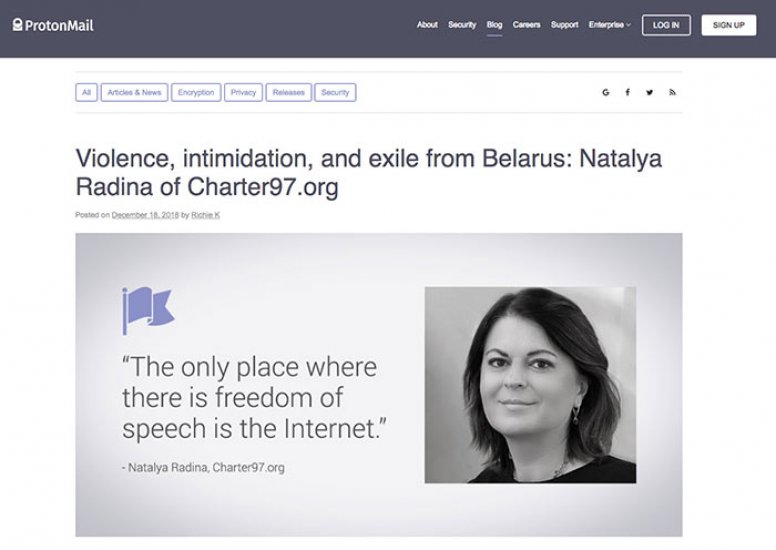Well-Known Global Encrypted Email Service Announced Auction In Support Of Charter-97
13- 21.12.2018, 13:20
- 78,514

ProtonMail is running a campaign of solidarity with Charter97.org.
ProtonMail is the world's safest email service. It was developed by young scientists from CERN and the Massachusetts Institute of Technology. This service offers encrypted emailing, therefore, ProtonMail may be a good choice for those who are at risk, who have reason to be wary of surveillance and interception of their emails: civil society activists, independent journalists, human rights defenders, politicians, environmentalists.
When the company learned about the blocking of Charter97.org in Belarus, they offered their help. Dr. Andy Yen, the ProtonMail CEO and founder, wrote this in his letter to the site editor Natallia Radzina.
To support Charter97, ProtonMail has announced a ProtonMail lifetime account auction on the eBay portal. All of the funds raised will be donated to the Charter97's editorial office.
By the way, this form of support is ideal for Belarusian businessmen who fear to provide direct help to the website. Your ProtonMail account will not be associated with Charter97, and eBay does not disclose information about the bidders. So go for it, and we will be sincerely grateful to you.
An article about Charter97.org editor-in-chief Natallia Radzina was published on the ProtonMail website:

- Despite running one of Belarus’s most trusted news sites, Natallia Radzina has not stepped foot in the country in over seven years. She runs and edits Charter’97 from just across the border in Poland, where she lives in exile. She does not say where she is in Poland because she still receives regular death threats from the Belarusian government, led by Alexander Lukashenko, also known as “Europe’s Last Dictator.”
Radzina’s willingness to honestly and fearlessly report on the corruption, human rights violations, and wrongdoings of the Belarusian government defines her life. It has earned her the respect of her peers and numerous awards, including the 2011 International Press Freedom Award from the Committee to Protect Journalists. It has also drawn the ire of the Lukashenko regime, put her life in danger, and forced her out of the country she loves.
Radzina was forced to flee Belarus in 2011 after the contentious Belarusian presidential election in 2010. While Lukashenko had wielded autocratic power before, bringing TV stations, radio channels, and newspapers under state control, the run-up to the election saw his government take even more draconian measures. On Dec. 19, 2010, Lukashenko was re-elected to his fourth term as president in an election that experts called a farce. The day of the vote, state police beat and arrested several of Lukashenko’s rival presidential candidates. Two days after the election, Lukashenko turned his attention to his critics. The Belarus state security service, which still carries its Soviet-era name, the KGB, rounded up protesters, political opponents, and journalists, including Radzina.
“I was arrested in the Charter’97 office while I was writing about brutal force used against our peaceful demonstration. All the journalists and volunteers who were in the office were also arrested. All of them were put in prison for 15 days, where they were pressured and intimidated,” Radzina said.
The KGB held Radzina in prison for two months. In the cells next to her were the former presidential candidates and their political teams. Abuse was rampant. The men were beaten and forced to stand naked in the bitter Belarusian cold. The women were chained in icy cells and treated like animals.
“They tried to break our will and our dignity,” she said.
Radzina was kept in complete isolation in a cell without a toilet. Her access to water was restricted. “The warden admitted that they were doing it so that I couldn’t ever have children,” she said.
The government’s goal was to get those in prison to inform on others. Radzina refused. After two months she was released, but the horrors she faced had not ended. The Lukashenko regime had charged her with four counts of “organization of mass disorder.” She faced a 15-year prison sentence.
Radzina had reason to fear that the government would silence her, one way or another. On Sept. 3, 2010, only months before the presidential election, Charter’97’s co-founder, director, and Radzina’s good friend, Aleh Byabenin, was found hanged in his summer home in Minsk. Byabenin had long been a target of the Lukashenko regime and his supporters. In 1997, unknown assailants abducted him and subjected him to a mock execution. After a brief investigation into the hanging, the authorities ruled it a probable suicide. Radzina has never accepted this conclusion. She points to the fact that Byabenin had scars on his hands, indicating a struggle.
“I’m sure that a proper investigation will be made when the situation changes and we will find out who killed our friend,” she said.
But not even fearing for her life could drive her from Belarus. She only fled her country when the government began stationing KGB “supervisors” in independent media offices, making real reporting impossible.
“I couldn’t accept such a scenario,” Radzina said. “Two months after I was released with the obligation not to leave the country, I fled Belarus on the eve of my trial. I couldn’t have worked while on ‘the short chain’ of the secret services.”
Since fleeing to Poland, Radzina and Charter’97 have continued to speak truth to power and to reliably report on abuses perpetrated by the Belarusian government. It has not been easy. On Jan. 24 this year, the Belarusian authorities blocked access to Charter97.org. Today, it is only accessible in Belarus through VPN services such as ProtonVPN. Before the government began its cyber blockade, Radzina reported that the Charter’97 website had roughly 2.5 million unique users per month. The government’s censorship has brought that number down to a million, and yet it still remains the most popular independent Belarusian website.
“Belarusians are actively using VPNs, TOR, and anonymizers to bypass the blocking of Charter97.org … which is proof that Belarusians don’t believe in the propaganda of the dictator and want to get free information,” Radzina said.
Despite the urgency of Charter’97’s mission, the site is facing hard times. There is much less financial aid available to independent media sites in Eastern Europe and other post-Soviet countries.
“Today, due to a sharp decrease in financing, the very functioning of the website Charter97.org is under threat,” she said.
Radzina has vowed not to give up. Speaking with us over Skype, sitting in her small home in Poland, a land so close to the home she cannot return to, it is clear that Radzina, despite the threats, the imprisonment, the loss of friends, and being driven from her home, will continue her tireless pursuit of the truth.
“It is very important that the Charter’97 team managed to survive, we didn’t compromise our conscience, and we didn’t break down,” she said. “We remained loyal to our ideals. It’s precious.”
***
It will be recalled that on September 3 editor-in-chief of Charter-97 Natallia Radzina announced the threat to informational resource cause by drastic reduction in financing and called readers for solidarity. Ways to support the website:
DONATION VIA PAYPAL:
MULTI-CURRENCY ACCOUNT FOR ASSISTANCE:
Bank's name: Bank Millennium S.A.
Address: ul. Stanislawa Zaryna, 2A, 02-593, Warszawa
IBAN: PL 97 1160 2202 0000 0002 1671 1123
SWIFT: BIGBPLPW
Name of the account holder: Fundacja “KARTA ‘97”
Purpose/title of payment: Donation for statuary aims
You can contact us by the e-mail charter97@gmail.com










